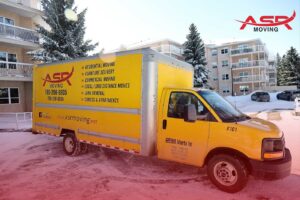Edmonton, the capital of Alberta, is known for its vibrant arts, diverse culture, and strong economy. Home to the West Edmonton Mall, one of the largest shopping centers in North America, and a vast network of scenic parks in its river valley, the city offers a mix of urban amenities and natural beauty.
Edmonton is also a major educational hub, housing the University of Alberta and several top-rated institutions.
As of April 2025, the median rent for all property types and bedroom counts in Edmonton is approximately $1,500 per month, 21% lower than the national average. The vacancy rate for purpose-built rental apartments in Edmonton was 4.8% in the fall of 2024.
In this article, we will explore key factors to consider before moving to Edmonton, including rental trends, popular neighborhoods, and average costs. Partnering with a reliable moving company in Edmonton ensures a smooth transition, allowing you to focus on settling into your new home.
Overview of Edmonton’s Rental Market
Edmonton’s rental market is diverse, catering to families, professionals, and students. The city offers a range of properties, including apartments, townhouses, and single-family homes. Rental demand tends to be higher in areas near transit, schools, and amenities.
While downtown areas offer modern apartments and condos, suburban neighborhoods provide spacious homes ideal for families. Edmonton’s rental prices remain affordable compared to other major Canadian cities, though costs vary depending on property type and location.
Average Rental Prices in Edmonton
- One-bedroom apartment: $1,000 to $1,300/month
- Two-bedroom apartment: $1,300 to $1,700/month
- Three-bedroom townhouse: $1,700 to $2,200/month
- Single-family home: $1,800 to $2,500/month
Rental prices fluctuate based on demand, seasonality, and neighborhood amenities, making it essential to compare multiple listings.
Types of Rental Properties in Edmonton
Understanding the types of rental properties available can help you choose the best fit for your lifestyle and budget. Edmonton offers a range of options, from high-rise condos to spacious single-family homes, catering to various living preferences.
1. Apartments and Condos
Ideal for singles, couples, and professionals, apartments and condos offer modern amenities and easy maintenance. High-rise condos in downtown Edmonton provide proximity to workplaces, dining, and entertainment. Many newer buildings feature fitness centers, security systems, and underground parking, appealing to those seeking a convenient urban lifestyle.
2. Townhouses
Townhouses offer more space and privacy, making them suitable for small families or roommates. These multi-level homes often include shared amenities like parking, yard space, and recreational facilities. Townhouses in family-friendly neighborhoods like Terwillegar Towne or Windermere provide a balanced mix of comfort and affordability.
3. Single-Family Homes
Families seeking larger living spaces often prefer single-family homes in suburban areas. These homes offer private yards, multiple bedrooms, and ample living space, making them ideal for families with children. Popular residential areas like Summerside and The Hamptons offer family-oriented communities with nearby schools, parks, and playgrounds.
4. Basement Suites
Basement suites provide a more affordable alternative, often equipped with a separate entrance, kitchen, and bathroom. They offer privacy at a lower cost, making them ideal for students, young professionals, or individuals looking to save on rent. Many basement suites are found in suburban neighborhoods, providing a quiet living environment while maintaining proximity to public transit and essential services.
Popular Neighborhoods for Renters
Choosing the right neighborhood in Edmonton plays a key role in enhancing your living experience. Edmonton offers a variety of neighborhoods catering to different lifestyles, preferences, and budgets. Here’s a look at some of the city’s most popular rental neighborhoods:
1. Downtown Edmonton
Downtown Edmonton is perfect for professionals seeking a vibrant urban lifestyle. It offers proximity to corporate offices, government buildings, and a lively dining and entertainment scene. Renters can enjoy modern condos and apartments with fitness centers and rooftop terraces. The ICE District and Rogers Place add to the excitement, making it a hub for events and nightlife.
2. Oliver
Located just west of downtown, Oliver is known for its walkability and mix of modern and historic architecture. It offers easy access to cafes, restaurants, parks, and public transit. This neighborhood appeals to young professionals and students, with many rental options, including high-rise and mid-rise apartments. The nearby River Valley provides outdoor enthusiasts with ample walking and cycling trails.
3. West Edmonton
West Edmonton is a family-friendly community offering good schools, parks, and recreational facilities. It’s ideal for families looking for spacious townhouses or single-family homes. The neighborhood is home to West Edmonton Mall, one of North America’s largest shopping and entertainment complexes, making it a desirable location for those who enjoy convenience and leisure activities.
4. Mill Woods
Mill Woods offers affordable rental options and various housing choices, including apartments, townhouses, and single-family homes. Popular among families and newcomers to the city, it boasts a diverse and multicultural community. The neighborhood features excellent amenities such as Mill Woods Town Centre, local schools, and recreational facilities, providing a balanced lifestyle for residents.
Additional Housing Costs and Budgeting Tips
Renting in Edmonton requires budgeting beyond monthly rent payments. Additional costs such as utilities, internet, and parking can impact your budget.
Estimated Monthly Costs
- Utilities (electricity, water, gas): $150 to $250
- Internet and Cable: $80 to $150
- Parking Fees: $50 to $150 (if not included in the rent)
Budgeting Tips
Managing your rental expenses effectively ensures financial stability and prevents unexpected financial strain. Consider these practical tips when budgeting for your move to Edmonton:
Allocate 30% of Your Income to Rent
A general rule of thumb is to spend no more than 30% of your monthly income on rent. This ensures you have enough left for utilities, groceries, transportation, and other essential expenses. Staying within this range helps maintain a healthy financial balance.
Include a Buffer for Unexpected Expenses
Set aside 5–10% of your budget to cover unexpected expenses or potential rent increases. This buffer can also help manage repairs, maintenance, or emergency costs, ensuring you’re prepared for unforeseen circumstances.
Review Lease Terms Carefully
Carefully review the lease terms to understand additional costs beyond rent, such as utility payments, parking fees, and maintenance charges. Knowing these costs upfront helps you budget accurately and avoid unpleasant surprises after moving in.
Legal Considerations for Renters
Complying with Alberta’s rental regulations ensures a smooth rental experience. Understanding tenant rights and responsibilities protects you from potential disputes.
Key Legal Aspects
- Lease Agreements: Review terms carefully, including rent payment schedules, termination clauses, and maintenance responsibilities.
- Security Deposit: Landlords may request a security deposit, typically equivalent to one month’s rent. It must be returned within 10 days of moving out, minus any deductions.
- Notice Periods: Tenants must provide one month’s notice before ending a month-to-month tenancy.
Preparing for Your Move with Asr Moving
Once you secure a rental, partnering with Edmonton moving services ensures a seamless transition. Our experienced team handles every aspect of your move, from packing and loading to transportation and unloading.
We offer flexible service packages tailored to your needs, including:
- Packing and Unpacking: Professional packing services ensure your belongings arrive safely.
- Furniture Disassembly and Assembly: We carefully handle the moving and packing of large furniture for secure transit.
- Storage Solutions: Short-term and long-term storage options for added convenience.
As one of the most reliable moving companies in Edmonton, we understand the unique challenges of relocating to a new city and strive to make the process smooth and stress-free.
Move with Confidence with Asr Moving
Understanding Edmonton’s rental market is key to finding the right home and ensuring a smooth transition. From comparing rental prices and choosing the best neighborhood to understanding tenant rights, being informed empowers you to make better decisions. When it’s time to move, trust Asr Moving, the best long-distance moving company in Edmonton, to handle the logistics and provide a hassle-free moving experience. Our professional movers and packers ensure that your belongings arrive safely, allowing you to settle into your new Edmonton home confidently.
FAQs
What is the average rent in Edmonton?
Rental prices vary depending on location and property type. One-bedroom apartments average $1,000 to $1,300/month, while single-family homes range from $1,800 to $2,500/month.
What documents are required to rent in Edmonton?
Landlords typically require proof of income, a government-issued ID, and a completed rental application. Some landlords may also request a credit report.
How much notice should I give before moving out?
For month-to-month leases, tenants must provide at least one month’s written notice before the end of the tenancy period.



